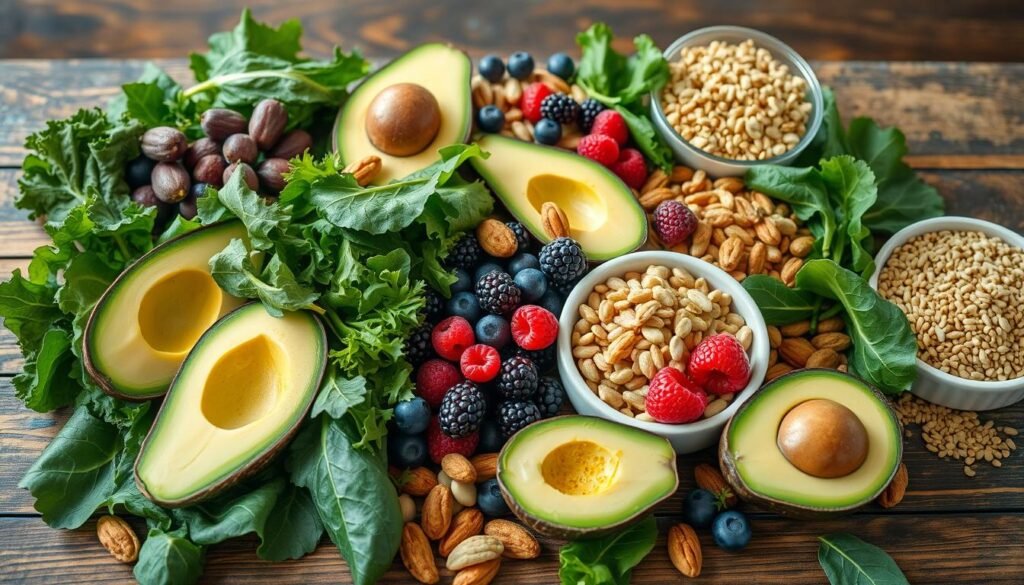Did you know about 40% of women feel a mild ache during ovulation? This ache is called mittelschmerz. It shows how big an impact hormonal changes during ovulation have on well-being. As women go through their menstrual cycle, their energy levels often change. Many feel tired around this time.
This article will look into the hormonal shifts during ovulation. It focuses on changes in estrogen and progesterone. These shifts can make you feel tired during your period. Knowing about these changes can help you handle the tiredness better.
Key Takeaways
- Ovulation happens in the middle of the menstrual cycle, usually on day 14 of a 28-day cycle.
- Changes in estrogen and progesterone levels during ovulation can make you feel tired.
- Stress, bad eating habits, and not enough sleep can make ovulation tiredness worse.
- Usual symptoms of ovulation include mild pelvic pain and mood changes.
- To deal with ovulation tiredness, try eating well and reducing stress.
- If you’re always very tired, you should see a doctor for possible health issues.
Understanding Ovulation and Its Importance
Ovulation is a key phase in the ovarian cycle, usually happening midway through menstruation. It’s vital for understanding when conception might occur. During this phase, a mature egg is released due to certain fertility hormones.
The impact of ovulation goes beyond just getting pregnant. It can influence mood, health, and energy. Many women experience mittelschmerz, or pain during ovulation. This affects over 40% of women of childbearing age.
Knowing when ovulation happens can shed light on your body and fertility. Observing basal body temperature or changes in cervical mucus are common tracking methods. The fertile window is about four days around ovulation day. This knowledge is key for reproductive health.
For extra information about ovulation’s phases and importance, visit Cleveland Clinic. Learning about this can help with planning for a baby and understanding ovulation’s effects.
What is Ovulation?
What is ovulation is a key part in the menstrual cycle. It’s when a mature egg is released from the ovary. This usually happens around day 14 of a typical 28-day cycle. Hormones like follicle-stimulating hormone (FSH) and luteinizing hormone (LH) trigger this egg release.
The egg lives for about 12 to 24 hours after ovulation. Sperm can live in a woman’s body for up to five days. This creates a fertility window. Peak fertility occurs two to three days before a rise in body temperature, which goes up slightly during this time.
Ovulation can bring physical changes due to rising estrogen levels. Energy might spike, but this can be brief. The shift in estrogen can affect mood and energy, showing how ovulation connects to overall health.
Physical feelings are part of the ovulation process too. Some women feel mild pain in their lower abdomen, called mittelschmerz. Knowing when ovulation happens is important for pregnancy planning or prevention. It helps women better understand and manage their reproductive health.
Hormonal Shifts During Ovulation Leading to Fatigue
Hormonal shifts during ovulation leading to fatigue are a big part of the menstrual cycle. Ovulation usually happens on the 14th day of a 28-day cycle. This is when hormone levels change a lot. The rise in estrogen just before ovulation helps get the body ready for a possible pregnancy. This can make you feel more energetic. During this time, many women find their libido increases, likely because of the changes in estrogen.
After ovulation, estrogen levels go down, and the body enters the luteal phase. Then, progesterone levels start to go up. This can cause symptoms like feeling very tired, having brain fog, mood changes, and craving certain foods. Cramping or pelvic pain can make this fatigue worse. More than 40% of women feel Mittelschmerz, or ovulation pain, which adds to the tiredness.
We shouldn’t ignore the emotional side of these hormonal changes. The stress of trying to get pregnant or just dealing with hormonal shifts can make you more sensitive and irritable. It can be overwhelming for women to deal with these ups and downs in hormones.
To fight the fatigue from these hormonal changes, resting more is key. It’s also important to drink plenty of water and eat a balanced diet. Keeping track of your menstrual cycle can help you see patterns in your fatigue. Then, you can plan ways to take care of yourself better.
| Phase | Hormonal Activity | Common Symptoms |
|---|---|---|
| Pre-Ovulation | Increasing Estrogen | Increased energy, heightened libido |
| Ovulation | Peak Estrogen | Possible Mittelschmerz, heightened emotional sensitivity |
| Post-Ovulation (Luteal) | Rising Progesterone | Fatigue, brain fog, mood swings, food cravings |
The Role of Estrogen in Energy Levels
Estrogen is key in managing energy in the body. It is especially important during the menstrual cycle. It helps keep mood and energy levels high. This is crucial for feeling good at different cycle stages.
Estrogen’s Peak During Ovulation
Before ovulation, estrogen hits its highest level. This boost makes people feel lively and motivated. It’s a time when you’re more active and ready for daily tasks. During this phase, cervical mucus also becomes thinner. This helps sperm move easier. It shows estrogen’s big role in both energy and reproductive health.
How Estrogen Affects Mood and Energy
Estrogen helps produce more serotonin, which improves mood and energy. But, energy and mood can change as estrogen levels go up and down. After ovulation, a drop in estrogen can make you feel tired and moody. This shows how important balance is for feeling good. Knowing about estrogen can help manage energy and mood all cycle long.

| Phase | Estrogen Levels | Effects on Energy and Mood |
|---|---|---|
| Follicular Phase | Rising | Increased energy and motivation |
| Ovulation | Peak | Optimized mood and high energy |
| Luteal Phase | Declining | Fatigue and mood swings |
Progesterone’s Impact on Fatigue
Understanding how progesterone levels work is key to getting why we feel tired during the luteal phase. After ovulation, progesterone levels jump up. This creates conditions that can deeply affect our energy.
Such an increase makes us feel very tired. This shows the tight link between progesterone and fatigue.
Increasing Progesterone Levels Post-Ovulation
As we move into the luteal phase of the menstrual cycle, progesterone levels go up. This leads to different effects on our bodies. For instance, women might feel sleepier because of the hormone’s calming effect.
Studies show higher progesterone levels make people feel more tired, especially if they already feel sluggish. One research found those in the luteal phase were slower in responding than others in the follicular phase. This suggests that effects of the luteal phase go beyond just feeling physically tired.
The Connection Between Progesterone and Tiredness
Progesterone boosts the making of GABA, a neurotransmitter that makes us relaxed. This leads to drowsiness. This effect is seen in both men and women and is crucial for how we manage energy.
Changing our lifestyles, like how we eat and sleep, can ease this luteal phase tiredness. If you’re taking progesterone supplements and feel very tired, talk to your doctor. This ensures your treatment fits your specific needs.
Other Contributing Factors to Ovulation Fatigue
Ovulation fatigue isn’t just about hormones. Many contributing factors to fatigue can make it worse. These factors really affect how tired you feel. It’s key to know them for better overall health during ovulation.
Stress and Its Influence on Energy Levels
Stress really drains your energy as it raises cortisol. This leads to stress and fatigue. During ovulation, many women feel more anxious. This is because of pressures like trying to conceive or workload.
Managing stress is vital. Relaxation methods, mindfulness, and good rest help keep energy up.
Poor Diet and Nutritional Needs During Ovulation
Nutrition is huge for energy levels, especially when you’re ovulating. Not paying attention to nutritional needs during ovulation can leave you tired. Eating foods rich in vitamins and minerals keeps energy stable. Include foods like porridge oats, bananas, and dark chocolate. They help fight off fatigue.
For those on special diets, it’s key to watch your nutrients. This avoids energy drops.

Also, drink plenty of water and exercise regularly. These steps help beat ovulation fatigue and encourage a healthy life.
For more tips on dealing with fatigue, check out natural remedies for adrenal fatigue.
Symptoms Accompanying Ovulation Fatigue
Ovulation fatigue is real and comes with symptoms that affect daily life. During ovulation, one might face both physical signs and emotional changes. These changes, like mood swings, happen because of hormone shifts. Knowing these symptoms is key to handling the tiredness that often comes with ovulation.
Physical Symptoms of Ovulation
Ovulation brings several physical symptoms. These symptoms vary in how strong they are. People often report:
- Ovulation pain or mittelschmerz, a mild pelvic pain on one side
- Bloating and nausea due to hormonal fluctuations
- Breast tenderness that can be discomforting
- Increased cervical mucus, which can enhance fertility
- Heightened sense of smell
- Variations in body temperature, which can indicate ovulation
These symptoms can make one feel more tired during ovulation. This adds to the experience of ovulation fatigue.
Mood Swings and Their Connection to Ovulation
Hormone changes during ovulation greatly affect mood. When estrogen levels peak, energy might go up at first. But then, as levels drop, one might feel irritable, anxious, or sad.
Many notice:
- Increased libido, which can coincide with a desire for connection
- Mood changes that can bring about both positivity and negativity
- General anxiety or irritability unrelated to external factors
Understanding mood swings as part of ovulation can help. It shows how hormone changes affect well-being during this time.
Managing Ovulation Fatigue Effectively
Ovulation fatigue can be managed with the right knowledge. Understanding various factors is key. Targeted lifestyle changes and good nutrition help boost energy during the menstrual cycle.
Lifestyle Modifications
Making lifestyle changes improves energy when ovulating. Activities like walking or yoga boost mood and energy. Drinking enough water is crucial to avoid fatigue.
Learning to manage stress helps too. Techniques like mindfulness relax the mind. Keeping an eye on your menstrual lets you plan better.
Nutritional Strategies to Combat Fatigue
A balanced diet is key to fight ovulation fatigue. Eating complex carbs, lean proteins, and fruits helps maintain energy. Adding iron-rich foods such as spinach fights iron loss fatigue.
Avoid too much sugar and caffeine to prevent crashes. Embracing whole grains and healthy fats boosts overall energy and clarity.
The Science Behind Ovulation Fatigue
The study of ovulation fatigue shows how changes in hormones affect energy. When women near ovulation, their hormones swing and cause tiredness. This tiredness can get stronger due to a spike in progesterone.
These hormonal changes can also lead to brain fog, irritability, and mood swings. Over 40% of women may feel ovulation pain, called mittelschmerz. This pain can drain energy levels. When women stay active during this time, they may feel even more tired.
It’s important for women to recognize when they might feel more tired. This can help them take care of themselves better. To fight this kind of fatigue, women should eat well, drink plenty of water, manage stress, and rest enough.
| Symptoms of Ovulation Fatigue | Impact on Energy Levels |
|---|---|
| Mild pelvic pain | Causes discomfort, potentially leading to increased tiredness |
| Changes in cervical mucus | Indicates hormonal shifts that may affect energy |
| Light spotting | Can provoke emotional distress, contributing to fatigue |
| Increased sex drive | May lead to physical exertion and subsequent tiredness |
| Breast tenderness and bloating | These symptoms can diminish overall comfort, enhancing fatigue |
Understanding ovulation fatigue allows women to manage their energy better. Learning about this phase of the menstrual cycle helps in developing personal strategies.
When to Seek Medical Help for Fatigue
Feeling tired during ovulation is normal. But if it’s too strong or lasts long, it could be a sign of something more serious.
If fatigue stops you from doing everyday things or comes with bad cramping, nausea, or mood changes, it’s time to look deeper. Issues like thyroid problems or Polycystic Ovarian Syndrome (PCOS) might be the cause. They can make you feel really tired for a long time. Seeing a doctor can help figure out why.
If your tiredness is extreme, pay close attention. Note how long and how often you feel this way. This info can help your doctor find out if there’s a bigger health issue.

Getting medical help early is key to dealing with any health problems. A correct diagnosis and quick treatment can really make a difference in how you feel and live.
Tracking Your Ovulation Cycle for Better Management
Keeping an eye on your ovulation cycle is very helpful. It helps manage symptoms tied to hormone changes. Through apps and fertility monitors, spotting patterns and predicting tiredness becomes easier. This knowledge lets women prepare better. They can tailor their activities, eating habits, and care routines to their cycle’s phases.
Having a system to track ovulation shows when you might have more energy or need more rest. Before ovulation, high estrogen levels usually bring a boost in energy and mood. After ovulation, increased progesterone may make you feel more tired and show other signs.
Effective tracking could mean keeping a journal or using tech. By noting how you feel and other key points, you get a clearer cycle view. This doesn’t just help with symptom management. It deepens your understanding of hormones and health. Knowing your tired times helps in planning for rest and recovery.
Using ovulation tracking tools can aid lifestyle changes. Daily exercise, around 30 minutes, boosts sleep quality and fights tiredness. Drinking about 11 glasses of water a day keeps you from getting tired from dehydration. These steps improve handling menstrual cycle symptoms.
Being aware of your body and its cycle through tracking can guide women through hormonal shifts. This self-awareness leads to healthier decisions and better well-being during this natural process.
Conclusion
The conclusion on ovulation fatigue is important. It highlights how hormonal changes during the menstrual cycle can affect women. Many females feel tired when they ovulate. Over 40% report feeling pain at this time, too.
Understanding these changes can help women manage their energy better. Making smart choices improves how one feels. These include sleeping well, drinking plenty of water, and eating a healthy diet.
Being active also boosts your mood. It helps fight off the tiredness linked with ovulation.
If the tiredness won’t go away, it’s best to see a doctor. Taking these steps not only makes you feel better but also makes the menstrual cycle easier. It helps women do well all month long.